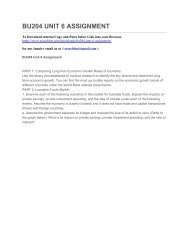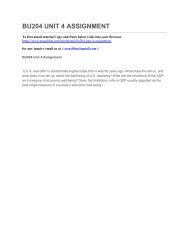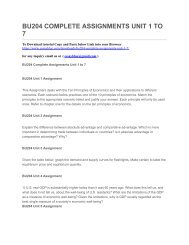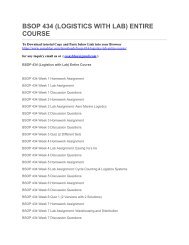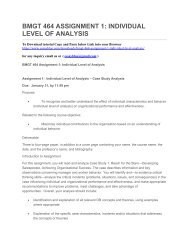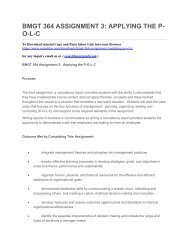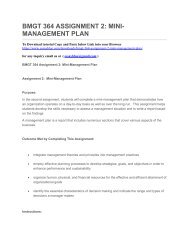BMGT 380 FINAL EXAMINATION
You also want an ePaper? Increase the reach of your titles
YUMPU automatically turns print PDFs into web optimized ePapers that Google loves.
17. Jim and Kiley are architects and general partners of JK Designs. Jim and Kiley<br />
supervise Luc, an employee of JK Designs. As general partners of JK Designs, Jim<br />
and Kiley:<br />
a) Are not personally liable for any tort(s) committed by Kiley.<br />
b) May be personally liable for malpractice committed by Luc working within<br />
the scope of his job at JK.<br />
c) Have limited liability for any of Kiley’s acts of malpractice.<br />
d) Have no liability for any torts committed by Luc.<br />
18. Kisha operates River Valley Soccer, an athletic equipment shop as a sole<br />
proprietorship. Taxes on the business’s income are paid by:<br />
a) No one; since it is a sole proprietorship there are no business taxes.<br />
b) Kisha as the sole owner.<br />
c) The state or federal government if Kisha holds a Small Business<br />
Administration loan acquired to start her business.<br />
d) The business entity of River Valley Soccer, not Kisha personally.<br />
19. Assume that Virginia enacted a law prohibiting, until further notice, all grocery<br />
stores in Virginia from selling all powdered spices manufactured in, or shipped<br />
from, Maryland. This law was enacted because it was discovered that the spices<br />
recently manufactured in Maryland were infected with bacteria. Determine the<br />
constitutionality of the Virginia statute. The statute is:<br />
a) Unconstitutional; it violates grocery store owners’ substantive and<br />
procedural due process rights under the 5th and 14th Amendments because<br />
they are private businesses.<br />
b) Unconstitutional; the statute imposes an undue burden on interstate<br />
commerce.<br />
c) Constitutional; it is a valid exercise of Virginia’s police power.<br />
d) Constitutional; the statute imposes an undue burden on intrastate and<br />
interstate commerce.<br />
20. Distinguish which of the following is an advantage of limited liability<br />
companies (LLCs) over corporations.<br />
a) Only one member of a LLC must have unlimited liability as compared<br />
with corporations in which all shareholders have unlimited liability.<br />
b) LLCs can be formed without any specific steps being taken by the owners<br />
as compared with corporations that must file Articles of Incorporation with<br />
the State.<br />
c) In most cases, a LLC can choose whether to be taxed as a partnership or<br />
corporation, as compared with corporations that are subject to double<br />
corporate taxation.<br />
d) LLCs can choose whether to sell shares publically to investors, as<br />
compared to private corporations that must sell shares publically to investors.




